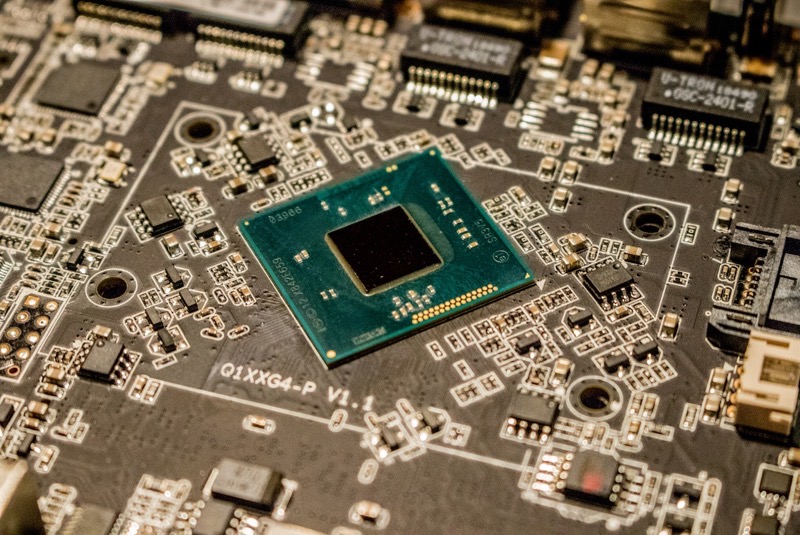A conflict between the US and China over computer chips – or semiconductors – has been escalating in recent months. In particular, the US has taken steps to limit China’s access to advanced chip technology amid heightened international competition in the area.
The US recently tightened export controls to undercut China’s access to high-end chip manufacturing equipment and has banned top talent from working for Chinese semiconductor firms. Beijing retaliated by banning US chip maker Micron from operating in China.
Taiwan plays a critical role in this struggle. It has a huge share of the global semiconductor industry, but is also the focus of tensions between Beijing and Washington over its political status.
For all practical purposes, Taiwan has been independent since 1949, but Beijing believes it should be reunited with the rest of China – possibly by force. In April 2023, China conducted extensive military drills near Taiwan, simulating an encirclement of the island.
So, what might happen to the chip industry were China to invade?
A US act passed in 1979 requires Washington to help defend Taiwan. Providing for the island’s security also fits with wider US objectives on technology and economic security. US politicians have not minced their words in affirming that a Chinese invasion would be met with a swift military response.
A Democratic congressman from Massachusetts, Seth Moulton, recently quipped that if China invades, “We’re going to blow up TSMC” – this being the acronym for Taiwan Semiconductor Manufacturing Company, the world’s most valuable semiconductor company. Congressman Moulton later clarified that he had been discussing several options for conveying the enormous costs of invading Taiwan to Beijing.
Because of Taiwan’s dominant position in the chip industry, its economy has been described as the the “most indispensable” in the world. And TSMC is the cornerstone of what’s been described as Taiwan’s “silicon shield” – the idea that an outsize global reliance on its microchips protects it from invasion by China.
Critical technology
The author Chris Miller tells the story of how Taiwan reached this dominant position in his book Chip War. It turns out to have been largely the result of strategic geopolitics and the individual leadership of several chip industry “godfathers”, including Morris Chang, the founder of TSMC.
Semiconductors are produced by a remarkably global supply chain, with design often stemming from US, Japanese or European firms, and manufacturing taking place in Taiwan and South Korea. However, Taiwan alone manufactures more than 60% of the world’s semiconductors -— and crucially, 90% of the most advanced ones.
There are fears the silicon shield might not hold forever, and an invasion by China would threaten the global economy with implosion. However, if TSMC were to build new manufacturing facilities elsewhere it would reduce the world’s reliance on Taiwan for chip production. A practice called “friendshoring” could concentrate manufacturing and the sourcing of materials outside Taiwan in countries friendly to the US. This would reduce risks to the US and its partners from an invasion.
However, such a shift would take years to complete and would be challenging to implement. In 2021, TSMC announced its plan to build a multi-billion-dollar facility in Arizona. But the plant will only be ready from 2025 at the earliest, and will probably not be capable of producing chips at what will by then be the technological frontier in terms of scale.
Generally speaking, the smaller the chip, the more transistors can fit on it. This enables the development of faster, more powerful electronic devices.
The Arizona facility is expected to produce chips at the 5 nanometre (nm) scale, and, at some stage, 3nm. This wouldn’t undermine Taiwan’s leadership, however, because TSMC is already working at 3nm in Taiwan and is likely to be further advanced by 2025.
TSMC may also face a challenge in attracting enough skilled employees to run its US operation.
The chip shortage
There is already a shortage of microchips, which began with the onset of COVID-19 in 2020 and has affected many industries and products. In 2021, global car production slumped 26% and consumer electronic product launches have been delayed largely as a result.
In a bid to boost chip supplies, the Biden administration and the EU have tried to improve supply chain resilience by incentivising production closer to home. The 2022 CHIPS and Science Act, for instance, offers more than US$50 billion (£40 billion) for semiconductor research and development, manufacturing and workforce development in the US.
Yet, these policies run counter to trade war tactics. Export controls and other downward pressures on global “friends” working with Chinese firms have meant that even when TSMC is at capacity, additional supply cannot come from Chinese manufacturers. Under current chip war conditions, low supply is likely to continue, which means price increases and product delays.
The military response to an invasion of Taiwan could see manufacturing of semiconductors on the island halted overnight. This would place marked pressure on the price of the chips manufactured outside Taiwan. The increase in chip prices would unleash massive inflation on a range of products and services, including cars, phones and healthcare equipment such as ultrasounds and vital sign monitors.
The reduction in semiconductor supply would also affect the very national security context that is shaping the contours of its production. A Taiwanese invasion would mean a halt to the availability of the advanced chips used in satellites, stealth jets, and supercomputers. China’s ambition of having a “fully modern” military by 2027, and its Made in China 2025 plan, to boost manufacturing, both hold semiconductor capabilities at the core.
Having access to TSMC know-how and supplies would be pivotal for delivering on these goals. But the US commitment to defending Taiwan – if it holds – would mean the destruction of TSMC facilities on the island. The world’s cutting-edge facilities for advanced chips would be decimated.
We should all care about a Chinese invasion of Taiwan. The global semiconductor industry would freeze. Inflation would spiral further upwards and the post-COVID recovery would be reversed. So many of the tools we rely on would disappear from our shops for years. It would wreak enormous damage on us all — with the Taiwanese people bearing the greatest cost.
-30-
Copyright©Madras Courier, All Rights Reserved. You may share using our article tools. Please don't cut articles from madrascourier.com and redistribute by email, post to the web, mobile phone or social media.Please send in your feed back and comments to [email protected]











